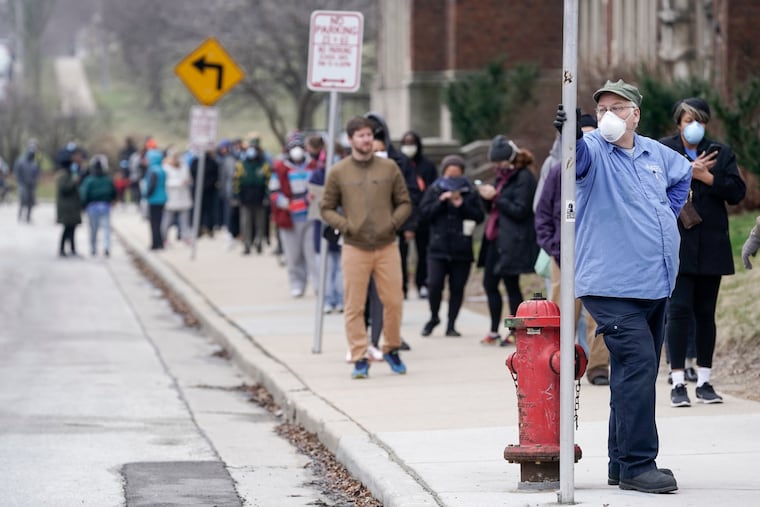Mobilize Pa. National Guard to secure the June primary | Opinion
One of the nation’s top election law experts explains why and how.

With the June primary approaching and ballots already in the mail, Pennsylvania now finds itself in the same position as most states when it comes to running an election in a pandemic: overwhelmed and unprepared. It is already past time to take drastic action. Gov. Tom Wolf needs to mobilize the National Guard now to help secure the vote for all Pennsylvanians.
The potentially devastating challenge that the pandemic poses for elections is now coming clearly into view. One need only look at what happened in Wisconsin’s April primary: mail ballots never received, massive poll worker shortages, most polling places shut down, and long, life-threatening lines for voters at a limited number of polling places put into operation.
Pennsylvania faces similar challenges. Even before the pandemic, local officials often struggled to recruit poll workers. The coronavirus has turned this perennial challenge into a crisis that threatens county officials’ ability to hold the upcoming election. At the state’s invitation, counties have dramatically scaled back in-person voting options to deal with the shortage of polling places and poll workers. Given the lower stakes of the primary, this move will receive less attention. But for the November election to proceed smoothly, more poll workers must be found. With nearly 20,000 members, the Pennsylvania National Guard could fill some of these shortages. The primary can serve as a dry run to ensure the state can mobilize adequately for the general election.
Wisconsin was able to pull off something resembling an election, despite all the challenges, in large part thanks to the last-minute mobilization of 2,400 National Guard members. For the first time in American history, these guardsmen served as poll workers, sanitized polling sites, and provided other emergency election assistance. While this mobilization occurred too late and was too small to fill all of Wisconsin’s staffing shortages, Wisconsin’s baptism-by-fire provides critical lessons for Pennsylvania. We offer three such lessons below.
First, Pennsylvania must begin planning this mobilization immediately. Time is of the essence to get the National Guard the required training, supplemental protective equipment, and necessary communication with local election officials. Local election officials need to know now how many guardsmen will be available to assist them with the surge of mail ballots so they know how many polling places they can staff on Election Day. And the three Pennsylvania counties legally required to have Spanish-speaking poll workers at each site need time to identify bilingual guard members and plan appropriately. During Wisconsin’s election, Milwaukee officials only knew the day before the election how many members of the guard would be available to them. It is no surprise, then, that they closed 97% of their polling places (five out of the normal 180 that are available). Pennsylvania must avoid repeating this mistake.
Second, the public needs to be reassured that the mobilization of the guard in no way signals some kind of militarization of the electoral process. Pennsylvania should follow Wisconsin’s example of allowing guard members to serve in civilian clothes under the control and oversight of local election officials. The Pennsylvania National Guard should only serve in a role supporting the accountable election officials in managing mail ballots and assisting in the polling places — augmenting, not replacing, civilian poll workers. They should serve in plain clothes, not guard uniforms. And they should also travel in civilian vehicles — not military vehicles — to avoid any confusion about their role.
Third, to the extent possible, National Guard members should serve in the communities in which they live. Wisconsin’s mobilization allocated National Guard personnel to polling places within their county of residence. This might not be possible or even desirable for all counties in Pennsylvania, depending on whether poll worker shortages are uniform throughout the state. But current guidelines for poll workers in Pennsylvania require that poll workers be registered voters in the counties in which they serve, and even if not formally required, local officials and voters may be more comfortable with guard involvement if it consists of people from their own community.
We have spent hundreds of billions of dollars and lost thousands of American lives in the last two decades trying to bring democracy to far-flung corners of the globe. It is time we spend a sliver of that expense securing our own democracy from the greatest threat it has faced in recent memory. The virus has deprived Pennsylvania of most of the volunteers it needs to provide the most basic staffing to support its elections. We need to mobilize all available resources now, including the National Guard, to make sure that our elections remain free and fair … and healthy.
Nathaniel Persily is the James B. McClatchy professor of law at Stanford Law School. He is the director of the Stanford Cyber Policy Center and the former research director of the Presidential Commission on Election Administration. Tom Westphal studies at Stanford Law School and is an officer in the U.S. Army Reserves.